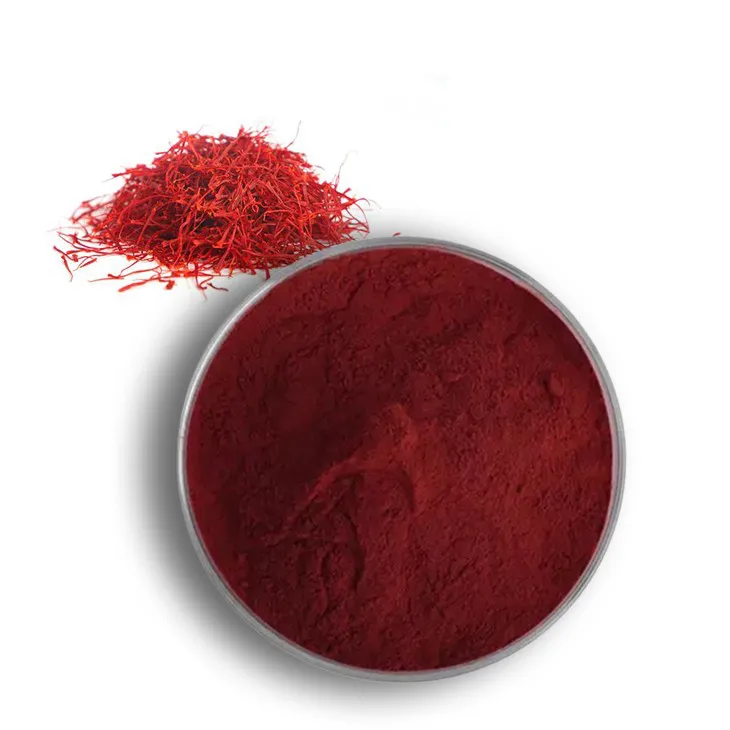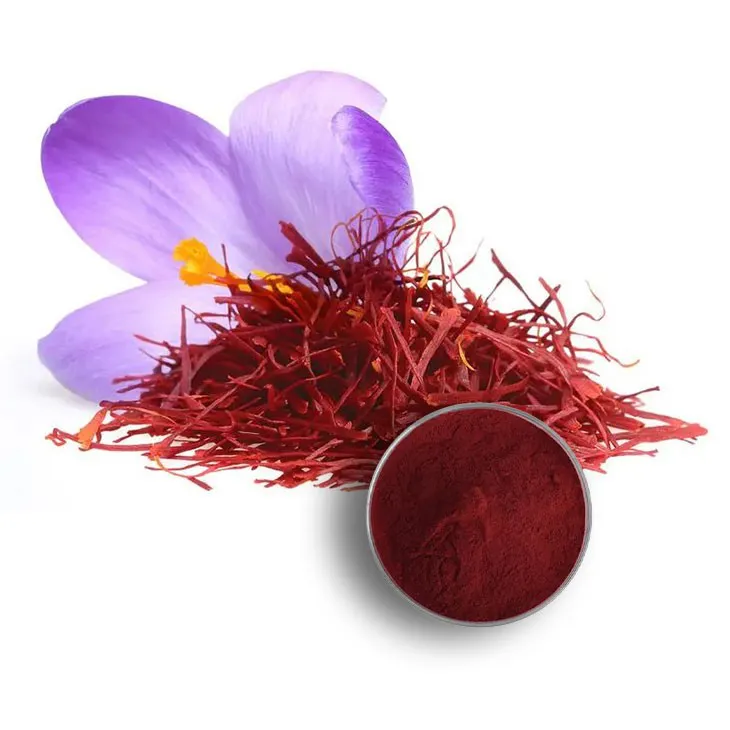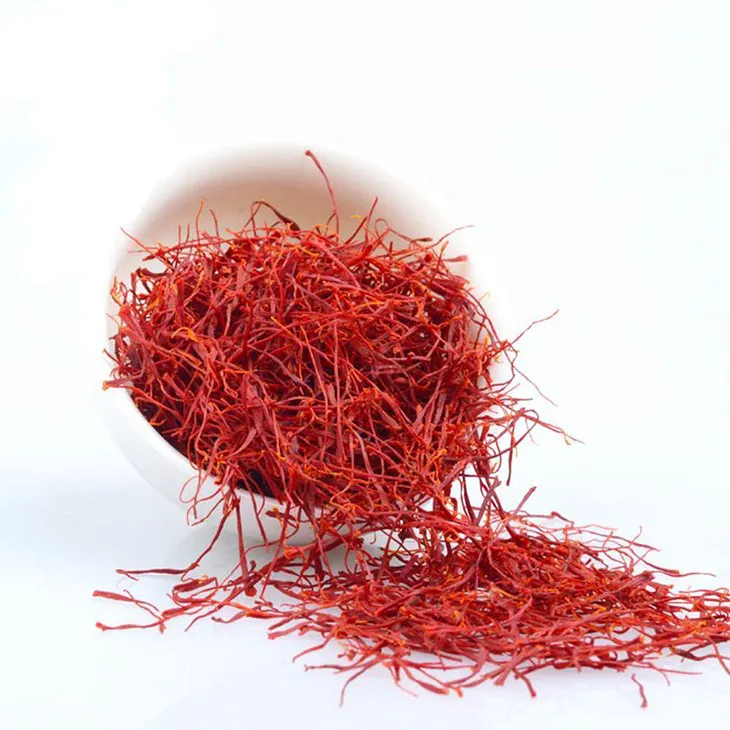- 0086-571-85302990
- sales@greenskybio.com
Saffron Extract Powder: Nature's Best - Kept Secret.
2024-11-12

Introduction
Saffron, often referred to as nature's best - kept secret, has a long and fascinating history. Saffron Extract Powder is a concentrated form of this precious spice that is now gaining more and more attention in various fields. This article aims to comprehensively explore the world of Saffron Extract Powder, from its historical roots to its modern - day applications.

Historical and Cultural Significance
Ancient Origins
Saffron has been used for thousands of years. It has its origins in the Middle East and Mediterranean regions. The ancient civilizations, such as the Persians, Greeks, and Romans, highly valued saffron. It was used not only as a spice but also in religious ceremonies and as a form of currency in some cases. The labor - intensive process of harvesting saffron has made it a luxury item throughout history. Each saffron thread has to be carefully hand - picked from the flower, which contributed to its high cost and exclusivity.
Cultural Importance
- In many cultures, saffron is associated with celebration and festivity. For example, in Indian cuisine, saffron is used to make traditional desserts like kesar pista kulfi and is an essential ingredient in many festive dishes during Diwali and weddings. - In Persian culture, saffron is deeply ingrained. Persian carpets are sometimes dyed with saffron to give them a unique color. Saffron is also a key ingredient in Persian rice dishes such as chelo kabab. - In Spanish cuisine, the famous paella often contains saffron, which imparts a distinct flavor and a beautiful golden color to the dish.

Botanical Profile
The Saffron Crocus
Saffron is derived from the Crocus sativus flower. This flower is unique in many ways. It blooms in the fall, and each flower has three bright red stigmas which are the source of saffron. The plant is relatively small, and it requires specific soil and climate conditions to thrive. It prefers well - drained soil and a relatively dry climate. Cultivating saffron can be a challenging task as it is sensitive to over - watering and extreme temperatures.
Harvesting and Processing
1. Harvesting: The harvesting of saffron is a meticulous process. It is typically done by hand in the early morning when the flowers are fresh. Workers carefully pluck the stigmas from the flowers. 2. Drying: After harvesting, the stigmas are dried. This is a crucial step as it helps in preserving the saffron and concentrating its flavors. The drying process can take several days, and it is usually done in a well - ventilated area. 3. Grinding into Powder: Once dried, the saffron stigmas can be ground into a fine powder. This powder is what we refer to as Saffron Extract Powder. The grinding process should be done carefully to ensure the powder is of high quality and retains all the beneficial properties of saffron.

Traditional Medicinal Uses
Antioxidant Properties
Saffron extract powder is rich in antioxidants. Antioxidants play a vital role in protecting the body against free radicals. Free radicals are unstable molecules that can damage cells and contribute to various diseases such as cancer, heart disease, and aging - related disorders. The antioxidants in saffron, such as crocin and crocetin, help neutralize these free radicals, thereby promoting overall health.
Mood - enhancing Effects
- Saffron has been traditionally used to improve mood. It is believed to have a positive impact on neurotransmitters in the brain. Some studies suggest that saffron may be effective in treating mild to moderate depression. - In traditional medicine systems like Ayurveda, saffron was often prescribed for those suffering from stress and anxiety. It was thought to have a calming effect on the nervous system.
Digestive Health
- Saffron has been used to aid digestion. It can stimulate the production of digestive enzymes, which helps in breaking down food more efficiently. - In some traditional remedies, saffron was used to treat stomachaches and indigestion. It was often consumed in the form of a tea or added to warm milk.
Modern - Day Applications
Skincare
- Saffron extract powder is now emerging as a popular ingredient in high - end skincare products. Its antioxidant properties make it effective in fighting skin aging. It can help reduce the appearance of wrinkles and fine lines by protecting the skin from oxidative stress. - Saffron also has anti - inflammatory properties, which can be beneficial for those with acne - prone or sensitive skin. It can help soothe inflammation and redness. - Some skincare products containing saffron extract powder claim to improve skin tone and give a natural glow to the skin.
Food and Beverage Industry
- In the food industry, saffron extract powder is used as a natural flavoring agent. It can add a unique and luxurious flavor to a wide range of products, from baked goods to dairy products. - In the beverage industry, saffron - flavored drinks are becoming more popular. Saffron can be used to make teas, liqueurs, and even non - alcoholic beverages with a distinct and exotic flavor.
Supplements
- Saffron extract powder is also available in supplement form. These supplements are often marketed for their potential health benefits, such as mood enhancement and antioxidant support. - However, it is important to note that when taking saffron supplements, one should follow the recommended dosage and consult a healthcare professional, as excessive intake may have adverse effects.
Research and Scientific Studies
Clinical Trials on Depression
Several clinical trials have been conducted to study the effectiveness of saffron in treating depression. Some of these studies have shown promising results. For example, in a double - blind, placebo - controlled study, saffron extract was found to be as effective as some common antidepressant medications in treating mild to moderate depression. However, more research is still needed to fully understand the mechanisms behind saffron's mood - enhancing effects and to determine its long - term safety and efficacy.
Anticancer Properties
- In vitro and some animal studies have suggested that saffron may have anticancer properties. The compounds in saffron, such as crocin and crocetin, have been shown to inhibit the growth of cancer cells in certain types of cancers, including breast cancer and leukemia. - However, it is important to note that these studies are in the early stages, and human clinical trials are needed to confirm whether saffron can be used as an effective cancer treatment or prevention strategy.
Challenges in Saffron Production and Quality Control
Production Challenges
- As mentioned earlier, saffron cultivation is labor - intensive and requires specific environmental conditions. This makes it difficult to increase production on a large scale. - Climate change also poses a threat to saffron production. Changes in temperature and rainfall patterns can affect the growth and yield of saffron plants.
Quality Control
- Ensuring the quality of saffron extract powder is crucial. There are issues such as adulteration, where some unethical producers may mix saffron with other substances to increase their profits. - Standardized testing methods are needed to accurately determine the quality of saffron extract powder. These methods should be able to detect the presence of active compounds and ensure that the powder meets certain purity standards.
Conclusion
Saffron extract powder is truly a remarkable substance with a rich history and a wide range of potential applications. From its historical and cultural significance to its modern - day uses in skincare, food, and medicine, saffron has a lot to offer. However, there are also challenges in its production and quality control that need to be addressed. As research continues, we can expect to learn more about the full potential of saffron extract powder and how it can be harnessed for the benefit of human health and well - being.
FAQ:
What is Saffron Extract Powder?
Saffron Extract Powder is a concentrated form of saffron. Saffron is a spice derived from the flower of Crocus sativus. The extract powder contains various bioactive compounds from saffron, such as crocin, safranal and picrocrocin, which are believed to contribute to its many potential benefits.
What is the historical significance of saffron?
Saffron has a long and rich history. It has been used for thousands of years. In ancient times, it was highly prized and used in religious ceremonies, as a dye, and in medicine. It was often associated with luxury and was traded over long distances. For example, in ancient Persia, saffron was used in royal courts and in traditional Persian medicine.
How is Saffron Extract Powder used in traditional medicine?
In traditional medicine, Saffron Extract Powder has been used to treat a variety of ailments. It has been thought to have anti - inflammatory properties, so it was used for conditions related to inflammation. It was also used to improve mood, as it may have an impact on neurotransmitters in the brain. Additionally, it was used for digestive problems and some believed it could boost the immune system.
What are the modern - day applications of Saffron Extract Powder in skincare?
Today, Saffron Extract Powder is emerging in high - end skincare products. It is rich in antioxidants, which can help protect the skin from free radical damage. It may also have anti - aging properties, potentially reducing the appearance of wrinkles and fine lines. Saffron can also help improve skin complexion, making it more radiant and even - toned.
Is Saffron Extract Powder safe to use?
When used in appropriate amounts, Saffron Extract Powder is generally considered safe. However, excessive consumption can have side effects. Some people may be allergic to saffron. Also, pregnant women should be cautious as high doses may have potential effects on the fetus. It is always advisable to consult a healthcare professional before starting to use any new supplement or product containing Saffron Extract Powder.
Related literature
- The History and Medicinal Properties of Saffron"
- "Saffron Extract in Modern Skincare: A Review"
- "Beneficial Effects of Saffron and Its Compounds"
- ▶ Hesperidin
- ▶ Citrus Bioflavonoids
- ▶ Plant Extract
- ▶ lycopene
- ▶ Diosmin
- ▶ Grape seed extract
- ▶ Sea buckthorn Juice Powder
- ▶ Fruit Juice Powder
- ▶ Hops Extract
- ▶ Artichoke Extract
- ▶ Mushroom extract
- ▶ Astaxanthin
- ▶ Green Tea Extract
- ▶ Curcumin
- ▶ Horse Chestnut Extract
- ▶ Other Product
- ▶ Boswellia Serrata Extract
- ▶ Resveratrol
- ▶ Marigold Extract
- ▶ Grape Leaf Extract
- ▶ New Product
- ▶ Aminolevulinic acid
- ▶ Cranberry Extract
- ▶ Red Yeast Rice
- ▶ Red Wine Extract
-
Tormentil Extract
2024-11-12
-
Artichoke Leaf Extract
2024-11-12
-
Grape Seed Extract
2024-11-12
-
Oat Straw Extract Powder
2024-11-12
-
Shikonin
2024-11-12
-
Propolis Extract Powder
2024-11-12
-
Eucommia Ulmoides Extract
2024-11-12
-
Berberis aristata Extract
2024-11-12
-
Lavender Extract
2024-11-12
-
Lemon Juice Powder
2024-11-12





















